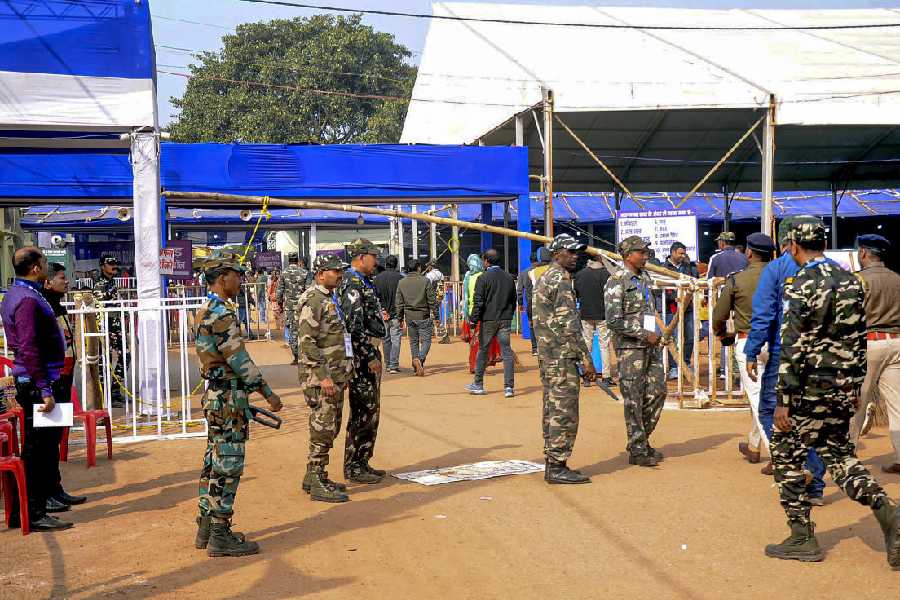At the time of the truce or ‘humanitarian pause’, the number of people killed by Israel in its pulverisation of Gaza was 14,532 according to the Gaza media office, with an additional 7,000 missing, likely buried in the rubble. Forty per cent of this figure is made up of children, and women and children together account for approximately two-thirds of the death toll.
No conflict in the 21st century has seen children being killed at such a rate. Eighty per cent of Gaza’s population has been made homeless. Nearly every member of the Israeli cabinet has made statements that rhetorically endorse genocide and/or ethnic cleansing in Gaza. And yet, the leaders of the Western world, with a couple of honourable exceptions, continue to legitimise and endorse Israel’s slaughter as a natural extension of its right to self-defence or as the inevitable consequence of Hamas’s October 7 massacre.
The West has chosen a side. Its sponsorship of Israel is not new; what is novel and clarifying is the stark relief in which its partisanship can be viewed against the backdrop of this bloody war. Gaza is so small and densely populated that the cruelty of war is condensed into an easily understood graphic. The atrocitiesvthat might have been obscured by ignorance in some other, more complex, geography are brutally clear in Gaza.
A territory stoppered at two ends by closed border crossings is bombed into submission. Its northern population is forced south by Israel, allegedly for its own safety, and then ordered to move again under the threat of more bombardment after the north has been reduced to rubble. Twenty-one thousand dead and two million people, living for the most part in tents as winter approaches, hungry, thirsty, and threatened by disease, are classed as collateral damage proportionate to Israel’s military aim of eradicating Hamas.
This is a hard case to make. It doesn’t help that Israel’s rogue settler population in the West Bank has declared open season on Palestinians with the active aid of the Israel Defense Forces. Yet the governments of the United Kingdom and Germany and, most notably, the United States of America have doubled down and insist that there will be no call for a ceasefire till Israel has destroyed Hamas. When this is set against the videos of hundreds of dead Palestinians in blue body bags being buried in mass graves, connivance in collective punishment mutates into something darker; it begins to seem like complicity in war crimes.
The reputation of the West, such as it was, for championing universal values and a rules-based order is unlikely to recover from this Gazan adventure. Gaza seems like an inflection point in the shaping of world opinion because the West’s leaders — Rishi Sunak and Keir Starmer and Olaf Scholz and Joe Biden — didn’t pretend, this time round, to be even-handed. Starmer declared on public radio that Israel was entitled to besiege Gaza and cut off water and electricity. The German government threatened to deport immigrants who posted in support of the Palestinian cause. Biden fast-tracked weapons shipments and promised fourteen billion dollars in military aid.
It is the brazenness of the West’s hostility towards the Palestinians, as opposed to its traditional hypocrisy, that makes this moment historic. Why this happened now will be argued over interminably by historians, but as contemporaries we can guess at the reasons. There has always been a tendency in Western governments to see Israel as a Western country in a rough neighbourhood. Israel’s foundation in the aftermath of the Holocaust in the heart of Europe, the crucial role of European Ashkenazi Jews in Israel’s creation, gave it a claim to being a kind of honorary European nation.
Russia’s invasion of Ukraine led to a circling of Western wagons. Before that, the great fear about China, provoked by Xi Jinping’s assertiveness and stoked by the US, had consolidated a sense of Western identity that had dissipated in the decades after the disappearance of the Soviet Union. In this charged geopolitical environment, Hamas’s massacre of Israeli civilians seemed both an outrage and a cue for Western solidarity with Israel against the savagery of Islamists.
What began as solidarity with Israel mutated into something uglier. As massive demonstrations in the great cities of the West made the case for the Palestinians and a ceasefire, Western governments and their intellectual auxiliaries began to see the marchers, especially those that were migrants and Muslims, as Trojan horses that threatened not just Israel but their own sense of self. The absence of uniform solidarity with Israel seemed like the presence of an insidious alienness.
The best example of pro-Israel feeling being directed at the enemy within comes from a German civil society organisation, not the State. The director of the International Short Film Festival Oberhausen, Lars Henrik Gass, posted a message on the Festival’s official Facebook page in which he urged Berliners to join a rally in Berlin to express solidarity with Israel and to demonstrate against anti-Semitism: “Half a million people took to the streets in March 2022 to protest Russia’s invasion of Ukraine. This was important. Please let us now send a signal that is at least as strong. Show the world that the Neukölln Hamas friends and Jew haters are in the minority.” (Emphasis added.)
The dogwhistle here is the place reference. Neukölln is the name of a borough in Berlin which has a high percentage of immigrants. Eighteen per cent of the borough’s population is of Middle-Eastern origin and it is host to a substantial Palestinian community. Instead of straightforwardly asking for solidarity against anti-Semitism and for Israel, the director of one of the important short film festivals in Europe chose to smear Neukölln’s immigrant community as Jew haters instead.
From Israel being a European country in a rough neighbourhood, we have segued seamlessly, thanks to Gass and his ilk, to rough neighbourhoods in European countries. ‘Hamas’ has become a synonym for Palestinians in general and a metaphor for the Muslim immigrant, Europe’s favourite bogeyman.
The anxiety about immigration as a political issue feeds into the hard line that countries like Germany and the UK have taken against the Palestinian cause. If a hostile critique of Israel amounts to anti-Semitism, Europe’s moral health demands unequivocal support for Israel in times of trouble. Since Jeremy Corbyn was indicted for tolerating anti-Semitism in the Labour Party, Keir Starmer has performatively purged Labour of Corbynites and committed the party to a strongly pro-Israel position. British Muslims, traditionally committed Labour voters, are now treated by Starmer as a political embarrassment.
As European governments of the Left and the Right move to restrict immigration, the face of which is the Muslim migrant, they have chosen to use the charge of anti-Semitism as a way of disciplining and punishing disobedient minorities. The flip side of that coin is an Israel-right-or-wrong foreign policy that has brought Gaza to the brink of ethnic cleansing and genocide.
mukulkesavan@hotmail.com










